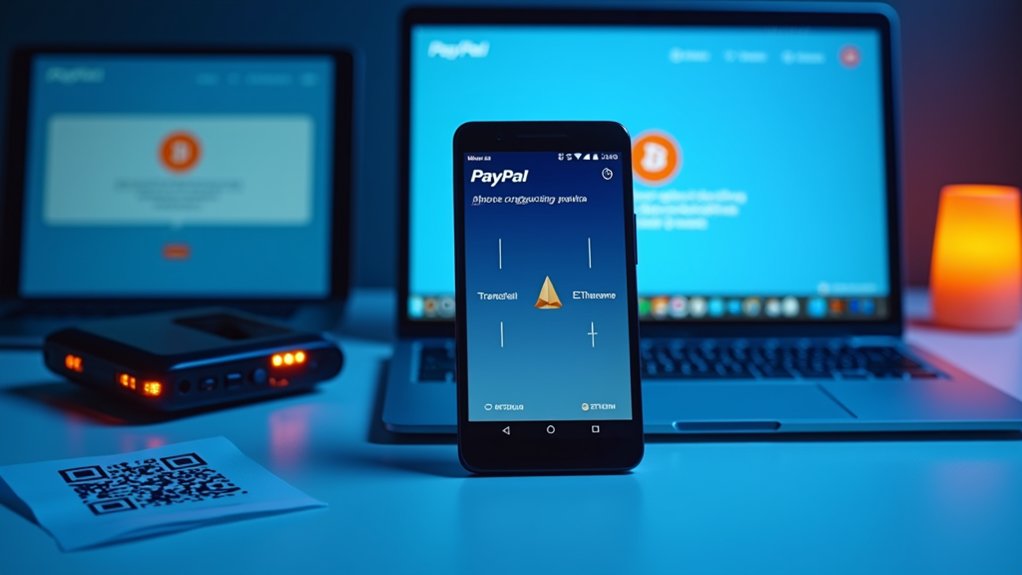PayPal users can transfer cryptocurrency to external wallets through the Finances section of their account interface. After selecting the desired cryptocurrency balance, users must initiate the send function, input the recipient's wallet address, and specify the transaction amount. A review screen displays network fees and processing time before final authorization. Business accounts cannot perform internal PayPal-to-PayPal crypto transfers, while verified personal accounts face fewer restrictions. The irreversible nature of blockchain transactions necessitates careful verification of all transfer details.

Many PayPal users have embraced the platform's cryptocurrency functionality, which now extends beyond simple buying and holding to include transferring digital assets to external wallets. The process, while streamlined for user accessibility, requires adherence to specific protocols and account requirements that guarantee regulatory compliance and transaction security in the evolving digital asset marketplace.
Initiating a cryptocurrency transfer from PayPal begins with accessing the Finances section of the account interface, where users must locate and select their Cryptocurrency Balance. Upon selecting the desired cryptocurrency asset, like Bitcoin, Ethereum, or other supported tokens, users will observe transfer arrows which, when tapped, present the option to send funds externally.
The platform then prompts users to input the recipient's wallet address through one of three methods: clipboard pasting, manual entry, or QR code scanning, with the latter providing enhanced accuracy for complex alphanumeric strings. Transaction amounts can be specified using either cryptocurrency denominations or fiat currency equivalents, offering flexibility based on the user's preference for calculation and record-keeping.
Prior to final authorization, PayPal presents a thorough review screen displaying all transaction parameters, including network fees, expected processing time, and irreversibility notices. Account verification represents a non-negotiable condition for cryptocurrency transfers, with identity verification procedures becoming particularly stringent for external wallet transmissions.
Business accounts face notable limitations, specifically the inability to participate in internal PayPal-to-PayPal cryptocurrency transfers, a restriction not applied to personal accounts meeting verification standards. Additionally, the system enforces crypto-specific address validation, preventing cross-asset transfers such as sending Bitcoin to Ethereum addresses, which would result in permanent asset loss. PayPal supports several digital currencies including Bitcoin Cash and Litecoin alongside Bitcoin and Ethereum for these transactions. Users should note that PayPal operates as a custodial wallet service, which means the company maintains control of private keys while providing simplified transaction processes.
Users should remain cognizant of potential transfer impediments, including negative account balances or pending purchase settlements, which may temporarily restrict transaction capabilities. The irreversible nature of blockchain transactions underscores the critical importance of address verification prior to confirmation, as incorrect destinations cannot be rectified through conventional dispute resolution mechanisms, distinguishing cryptocurrency transfers from traditional PayPal payment services that offer reversal options under certain circumstances.
Frequently Asked Questions
What Are Paypal's Crypto Transaction Limits?
PayPal's crypto transaction limits include a $25,000 USD weekly cap for all cryptocurrency transfers in the United States, combining both internal and external transactions.
These limits automatically reset every Friday at midnight, with minimum transfer thresholds varying by cryptocurrency, like 0.001 BTC or 0.01 ETH.
Additionally, external wallet purchases are subject to a separate $100,000 USD weekly limit, while fully verified accounts remain a requirement for external transfers.
Does Paypal Support All Cryptocurrencies?
PayPal supports a limited selection of cryptocurrencies, not the full spectrum available in the broader market. Currently, the platform accommodates only five digital assets: PayPal USD (PYUSD), Bitcoin (BTC), Ethereum (ETH), Litecoin (LTC), and Bitcoin Cash (BCH).
This restricted offering contrasts with competitors like Crypto.com, which provide access to a more extensive range of altcoins, including popular options like XRP and Solana.
Are There Tax Implications When Sending Crypto From Paypal?
Sending cryptocurrency from PayPal does not fundamentally trigger tax liability; however, if the transfer involves disposition (sale, exchange, or payment), capital gains or losses may apply.
Users remain responsible for tracking cost basis, particularly for external transfers, since PayPal's automated FIFO tracking only functions for in-platform activities.
While PayPal provides Transaction Summaries and Year-End statements, the IRS requires reporting of all virtual currency transactions on Form 1040, with dispositions necessitating Form 8949 documentation.
Can I Send Crypto to Hardware Wallets From Paypal?
Users can indeed transfer cryptocurrencies from PayPal to hardware wallets, since explicitly stated in PayPal's supported destinations.
The platform allows Bitcoin, Ethereum, Bitcoin Cash, and Litecoin transfers to external wallets, including hardware options that prioritize self-custody.
To complete these transfers, users must navigate to the Finances tab, select the appropriate crypto balance, and follow the step-by-step verification process, remaining mindful of the $25,000 weekly transfer limit and minimum requirements.
How Long Do Paypal Crypto Transfers Typically Take?
PayPal cryptocurrency transfers typically require approximately two hours under standard network conditions, though this timeline varies considerably based on cryptocurrency type and blockchain congestion.
Internal PayPal-to-PayPal transfers complete more rapidly than external transfers, which may face additional verification periods.
Security measures occasionally trigger 48-hour holds on flagged transactions, while resolution of security blocks may necessitate customer service intervention.
Recipients have 30 days to accept incoming crypto transfers once initiated.









